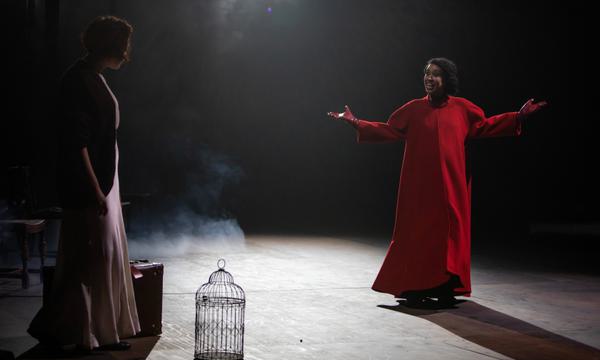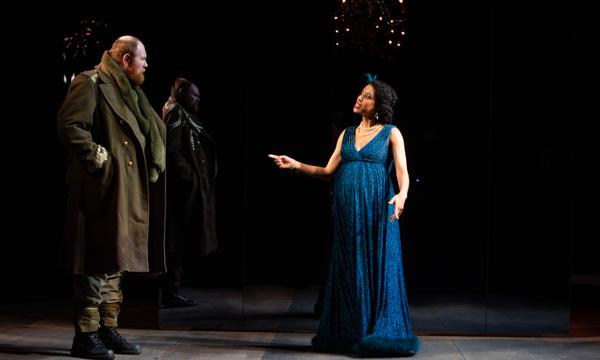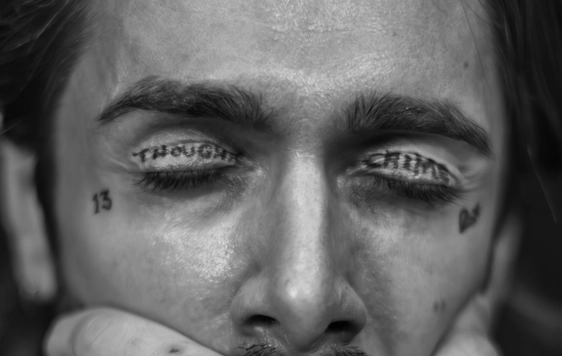News Story
Stage management, the backbone of any Lyceum production, hidden behind the stage. Our stage team are a busy bunch and always hard to pin down, they are either in rehearsals, setting up the stage or at our workshops in Roseburn hunting down some props. However, I was lucky enough to sit down with our very own Dan Dixon to talk about all things stage management.
What is your role and what are you responsible for?
I am the company stage manager. I am responsible for all the props, furniture and set dressing amongst other things (the list is quite long!). I am responsible for the rehearsal room, making sure it is clean and safe, making sure it is as accurate as possible in terms of the stage and set of the show, getting the markup* down on the floor and the rehearsal set in. We try to get most of the real set and props as we can to help the actors rehearse.


I am also responsible for all the communication that comes out of the rehearsal room, making sure that the actors know when they are in and what they are doing as well as the rehearsal notes from the day (this includes everything from how long the run through was if there was one to needing 4 teacups instead of 3) these notes go to all departments in the building.
I am responsible for the actors and their wellbeing, making sure they feel welcome, there is tea and coffee, and they have the up-to-date schedules for all rehearsals and tech runs etc. and that they are safe in our building.
I also try to figure out stage magic and making things happen when other people can’t figure it out (it’s a team effort) – but I just make it up most of the time and hope that it works. No one knows how to do everything and there will always be something new that you try to do in a show that you learn as you go. I also manage the team who are also responsible for all this, it’s not just all on me on my own.
What is a markup in a Rehearsal Room?
Some people call it a mark-out, but it is a representation of the set on the floor and how the space is going to be laid out on the main stage. If there is anything that will move or fly in – it is normally marked out with electrical tape (although this isn’t very sustainable, so we are trying to source alternatives that work just as well and last as long). From the ground plans that we get from the designer/workshop, which are a bird's eye view of the stage, we can see and mark out everything from the set pieces to the wings and other structures that will be on stage. This can be very 1 dimensional so we try to build something to help actors see it in 3D as much as possible, if there is something to stand on or a wall, we will try and have that in the space. Sometimes, as rehearsals go on, actors start to not notice the floor markings and start moving around in a way that wouldn’t be possible on the stage so we must make sure they know their limitations so the whole scene doesn’t have to be re-done when they move into the theatre. It is to try and give the actors as much of the real thing as possible as we don’t rehearse on the main stage, this is because we normally have other plays running on the main stage while rehearsals are happening in the studio. If the workshop has made set pieces, we bring it into the room asap so that actors can start working with the pieces. The only issue with that is, because our stage is raked, everything is anti-raked so when it's in the rehearsal studio it is wonky, but it won't be on the stage.
The rehearsal room isn't exactly the same size as the stage – the width matches the proscenium arch (8m 44) with a bit of the wings, but we don’t have the depth that we do on the main stage, because it goes back a long way, but you do get enough to be useful.
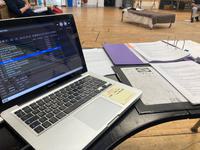
Talk me through how you would prepare for rehearsals as an SM
I will read through the script, that’s always the first thing. I’m always surprised by the people in creative teams who don’t read the script beforehand, it’s so important. I try to read it before I get to the model box presentations, so as the designers are talking through it I know what they are referencing, I can also come up with my own questions that have come up while reading through and make notes. If it’s easier you can get the script on a computer and use a read aloud feature/app which will also allow you to make notes. During the first readthrough, I highlight all the props and furniture that might be needed. This is so I can begin to create a list that will go on the production board in the office. They are checked off once sourced. I would also try to start hiring people for the show if we don’t have the staff in-house.
Once the script is read, I attend the model box meetings. I would take photos of the model box myself so that I have my own images, alongside a storyboard from the designer to help with referencing. One thing I think about in these meetings is whether we have enough wing space to fit the set when it’s not being used. When you get the ground plans, if there is a lot of set and things for the show, you have to consider where it is going to go when it is offstage. I am one of the logistical and practical heads in the meetings. Sometimes you must bear the bad news of not having enough space for things so designs have to be altered, there is a fine line between not being the bad guy and making a show work. It’s okay to ask questions if you don’t understand something.
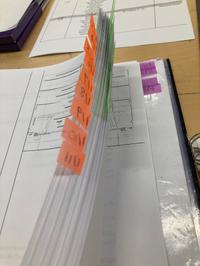

Budget is also something I think about before rehearsals start. Do we have enough money to buy/source everything that is needed for the show? Each show has a different budget, so you learn to be resourceful. I have already started trying to find the right props and furniture for Macbeth, looking at how much we have in store and how much we must buy.
Then I put the markup down in the rehearsal room once the previous show is out and call the cast. I think the phone calls are really important to make sure that the actors understand the schedule, they have a script and to say hello and welcome them to the company. Not everyone does this and I think it is such a good thing to do.
How do you find props? Are they all in-house or do you have to buy things?
They aren’t all in-house, but we do have a lot of things we can pull from Roseburn. However, the things we have only make up about 20% of what we need, unless it is a show we have had before or a co-production coming to us. If it is a Lyceum production, we've got to get it all.
We do buy a lot of things, but it also depends on the style of the show. I find that even if you buy things, you will still have to edit them in some way to make it fit with the show, painting or reupholstering, making it fit within the setting of the piece, even extending or fitting material to fit the space.
We also borrow things from other theatres, and they borrow things from us. There is quite a good, informal, borrowing system in Scotland as we can all get to each other quite quickly, a lot of borrowing happens within theatres here. We do also make things from scratch, depending on what it is, in our Roseburn workshop.
What is the biggest challenge about the Lyceum stage?
The raked stage is always difficult, having a slope always throws things up that you don’t expect, and things always behave in a different way. If you have any liquid on stage, it it just rolls off the front, if you have rain or blood, it will just want to end up in the audience. Likewise, if you have anything that rolls like balls or wheels, they will automatically roll towards the audience, so you've got to stop that happening and counteract it. We have to anti-rake everything that goes on the stage, so it looks straight to the audience, and this means that you've got to be very precise about where the set pieces go, so they don’t wobble and that’s hard if the scene changes without light.
Doors are also hard because of the rake and because they always need to do weird things. Sometimes they open and close by themselves, sometimes they stay open, sometimes they slam and that’s tricky when the stage is sloped because they want to go with gravity. It’s hardly ever used just as a door with a handle that opens and shuts by people.
What is the most rewarding thing about your job?
The weird thing about stage management is that people don’t know you’re there – or they are so absorbed in the performance that they forget that people are making everything happen behind the scenes. There is always a good buzz around press night when it’s all come together, if you think about it there is a whole lot of people and things that all come together to work at a specific time (you can’t ask for an extra week if you aren’t ready), so to get to that moment, and be that key cog in the whole process, is a great feeling when it happens, and everyone is clapping, and nothing went wrong.


The run can be quite repetitive as it’s the same every night but opening night where it all comes together is a good feeling. With that, there is that feeling of not being seen and not being applauded for what you have done but you know you have played your part; I like the feeling of being the unseen cog in the production.
The end of the opening night is rewarding of course, but the moment before the house opens when it is quiet, everyone is in their dressing rooms and FOH are getting things ready, there is a moment when you can stand on the stage and enjoy the silence for half an hour and think “we did it” that’s my favourite.
I also enjoy the first day that the cast are in the building, there is always a good vibe on that day when the building feels full again. The actors are in, the model box is set up, instruments are arriving, and the creative team are all together.
How did you get into stage management?
My first proper Assistant Stage Manager job was at the Traverse Theatre, but I did a lot of casual work before. Working with get in’s and fit-ups and moving wires and working events.
My drama teacher introduced me to the world of theatre behind the stage and I found it really interesting because I didn’t want to be an academic, I didn’t want to sit in an office, and I definitely didn’t want to wear a suit so that was why I got drawn to this world. I thought it would be easy if I'm honest, so I did it at school for school productions which I enjoyed and I loved putting on a show.
There was a course in Edinburgh where I specialised in Stage Management, and I went from there. The course isn’t running anymore but there is a school for stage managers in Edinburgh. There is a need for stage manager training now, if you want to get into the industry put yourself out there as places need us more than ever.
I always welcome student placements into the department and try to have them as much as I can. Placements normally come from universities or colleges in the city and surrounding areas but if you are interested in shadowing or seeing what we do, drop us an email and we will be more than happy to have a chat with you and see how we can help, we always welcome new faces.
The creative learning department also have a tech and stage management course that runs alongside the Summer on Stage programme which is a great chance to see how a main stage production operates and to shadow the department.

